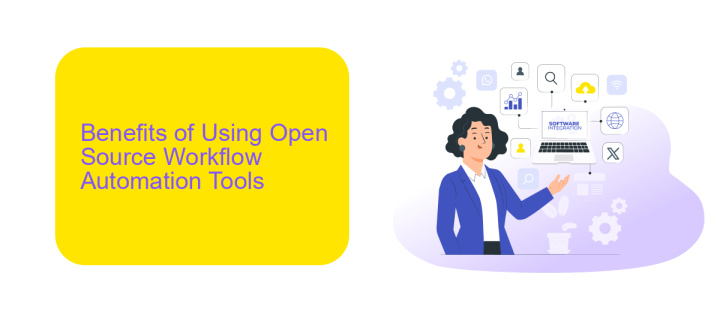Workflow Automation Open Source
Workflow automation has become an essential aspect of modern business operations, enhancing efficiency and reducing manual errors. Open-source solutions offer a cost-effective and flexible approach to automating workflows, enabling organizations to customize and scale their processes. This article explores the benefits, key features, and popular tools in the realm of open-source workflow automation.
Introduction to Workflow Automation
Workflow automation is a transformative approach that allows businesses to streamline and optimize their processes by automating repetitive tasks. This not only saves time but also reduces the risk of human error, leading to increased efficiency and productivity.
- Reduces manual effort and errors
- Increases efficiency and productivity
- Enables better resource management
- Improves compliance and tracking
- Facilitates seamless integration between systems
One of the key aspects of workflow automation is the ability to integrate various tools and services seamlessly. Platforms like ApiX-Drive make it easy to connect different applications and automate data transfers without requiring extensive coding knowledge. This enables businesses to create more cohesive and efficient workflows, ultimately driving better outcomes and fostering growth.
Benefits of Using Open Source Workflow Automation Tools

Open source workflow automation tools offer numerous benefits, starting with cost efficiency. Unlike proprietary software, open source solutions are usually free to use, which can significantly reduce operational expenses. Additionally, these tools are highly customizable, allowing businesses to tailor the software to meet their specific needs and workflows. This flexibility can lead to increased productivity and streamlined processes, as companies are not constrained by the limitations of off-the-shelf software.
Another major advantage is the community support that comes with open source tools. A vast network of developers and users continuously contributes to the improvement and security of the software, ensuring it remains up-to-date and reliable. Moreover, integrating various applications and services becomes easier with open source tools. For instance, services like ApiX-Drive can facilitate seamless integrations, allowing businesses to automate tasks across different platforms without extensive coding knowledge. This can further enhance efficiency and enable smoother operations.
Types of Open Source Workflow Automation Tools

Open source workflow automation tools are essential for streamlining business processes and improving productivity. These tools allow organizations to automate repetitive tasks, integrate various applications, and manage workflows efficiently without incurring high costs.
- Task Automation Tools: These tools focus on automating individual tasks within a workflow. Examples include Apache Airflow and n8n, which allow users to create, schedule, and monitor complex workflows.
- Integration Platforms: These tools help integrate different applications and services. ApiX-Drive is a notable example, offering seamless integration capabilities to connect various apps and automate data transfer between them.
- Business Process Management (BPM) Tools: These tools provide a comprehensive approach to managing and optimizing business processes. Camunda and Bonita are popular open source BPM tools that offer robust features for modeling, executing, and monitoring business processes.
Each type of tool serves a unique purpose, and organizations often use a combination of them to achieve optimal workflow automation. By leveraging open source solutions, businesses can customize and scale their automation efforts without significant financial investment.
Choosing the Right Open Source Workflow Automation Tool

Choosing the right open source workflow automation tool can significantly enhance your business processes, but making the right choice requires careful consideration. First, identify your specific needs and objectives. What tasks do you want to automate? What integrations are necessary for your existing systems?
Next, evaluate the available tools based on their features, ease of use, and community support. Look for tools that offer flexibility and scalability, allowing you to expand as your needs grow. Additionally, consider the security features and compliance with industry standards.
- Determine your automation needs and objectives
- Evaluate features, ease of use, and community support
- Check for flexibility, scalability, and security features
- Consider tools like ApiX-Drive for seamless integration
Finally, test the shortlisted tools with real-world scenarios to ensure they meet your requirements. Open source tools like ApiX-Drive can be particularly useful for integrating various services and automating complex workflows, making your business operations more efficient and effective.
Case Studies of Successful Open Source Workflow Automation Implementation
One notable example of successful open source workflow automation implementation is the case of a mid-sized e-commerce company that leveraged Apache Airflow to streamline its order processing system. By integrating Airflow with their existing databases and APIs, the company was able to automate the entire order lifecycle, from order placement to shipment tracking. This not only reduced manual errors but also significantly decreased processing time, leading to higher customer satisfaction and operational efficiency.
Another compelling case is a software development firm that utilized n8n, an open source workflow automation tool, to enhance its CI/CD pipeline. By incorporating ApiX-Drive for seamless integration between various development tools and platforms, the firm achieved a more cohesive and automated development environment. This allowed for real-time updates, better resource allocation, and faster deployment cycles. The implementation of these open source tools not only improved productivity but also provided the flexibility to adapt to future technological changes.
- Automate the work of an online store or landing
- Empower through integration
- Don't spend money on programmers and integrators
- Save time by automating routine tasks
FAQ
What is workflow automation in the context of open source?
What are the benefits of using open-source tools for workflow automation?
How can I integrate different applications in my workflow automation?
Is it difficult to set up workflow automation using open-source tools?
What are some common use cases for workflow automation?
Time is the most valuable resource for business today. Almost half of it is wasted on routine tasks. Your employees are constantly forced to perform monotonous tasks that are difficult to classify as important and specialized. You can leave everything as it is by hiring additional employees, or you can automate most of the business processes using the ApiX-Drive online connector to get rid of unnecessary time and money expenses once and for all. The choice is yours!


